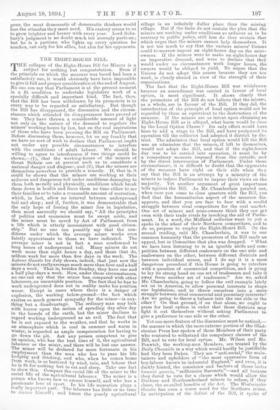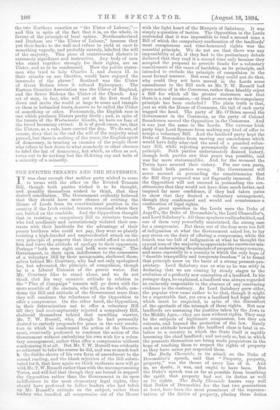THE EIGHT-HOURS BILL. T HE collapse of the Eight-Hours Bill for
Miners is a subject for nothing but congratulation. Even if the principle on which the measure was based had been a satisfactory one, it would obviously have been impossible to give it full and proper consideration at the end of August. No one can say that Parliament is at the present moment in a fit condition to undertake legislative work of a specially difficult and important kind. The fact, then, that the Bill has been withdrawn by its promoters is in every way to be regarded as satisfactory. But though the Bill has disappeared, the discussion and the circum- stances which attended its disappearance have proved of use. They have thrown a considerable amount of light not only on the nature of the demand to regulate the miners' working-hours by law, but on the real aspirations of those who have been pressing the Bill on Parliament. Before discussing these, however, let us say frankly that we have no sort of wish to declare that Parliament ought not under any possible circumstances to interfere with the conditions of adult labour. We should be willing to agree to interference if two things could be shown,—(1), that the working-hours of the miners of Great Britain are at present such as to constitute a national danger and disgrace, and (2), that the miners are themselves powerless to provide a remedy. If, that is, it could be shown that the miners are working at their arduous and dangerous toil under conditions damaging to them both morally and physically, conditions which break them down in health and leave them no time either to see their families or to take a reasonable amount of recreation, which, in fact, allow no interval between underground toil and sleep ; and if, further, it was demonstrable that the only hope of freeing the miner lies in legislation, then most assuredly we should say, " All the principles of politics and economics must be swept aside, and the miner must be saved by Act of Parliament from a life which is utterly inconsistent with good citizen- ship." But no one can possibly say that the con- ditions under which the average miner works even faintly approximate to those we have indicated. The average miner is not in fact a man condemned to long hours of underground toil. Many miners do not work more than eight hours a day, and those that do, seldom work for more than five days in the week. The Labour Gazette for July shows, indeed, that just now the miners do not really average much more than four and a halt days a week. That is, besides Sunday, they have one and a half play-days a week. Now, under these circumstances, no one can say that the miner has, compared with other labourers, an unenviable position. The fact that he has to work underground does not in reality make his position worse. Except in cases where there is a danger of explosion, the working below-ground—the fact which excites so much general sympathy for the miner—is any- thing but a disadvantage. The ordinary man may look with horror upon the notion of spending day after day in the bowels of the earth, but the miner declines to regard working underground as an evil. The fact that he is not exposed to the weather, and that he works in an atmosphere which is cool in summer and warm in winter, is regarded as ample compensation for having to go down the pit. Ask any person competent to give an opinion, who has the best time of it, the agricultural labourer or the miner, and there will be but one answer. The miner will be declared far more fortunate in his employment than the man who has to pass his life hedging and ditching, and who, when he comes home from work, is so battered by wind, rain, and labour that he is fit for nothing but to eat and sleep. Take one fact to show this. Compare the social life of the miner to the social life of the agricultural labourer. The miner is a person who knows how to amuse himself, and who has a passionate love of sport. In his life recreation plays a really important part. The labourer has little or no time to amuse himself ; and hence the purely agricultural village is an infinitely duller place than the mining village. But if the facts do not sustain the plea that the miners are working under conditions so arduous as to be contrary to public policy, still less do they sustain that which urges that the miners cannot help themselves. It is not too much to say that the various miners' Unions could to-morrow impose an eight-hours day on the mine- owners. If the miners were to make an eight-hours day an imperative demand, and were to declare that they would under no circumstances work longer hours, the owners would be obliged to yield. To argue that the Unions do not adopt this course because they are too weak, is clearly absurd in view of the strength of their organisations. The fact that the Eight-Hours Bill was withdrawn because an amendment was carried in favour of local option, is most significant. It shows clearly that the promoters of the Bill do not believe that the minere, as a whole, are in favour of the Bill. If they did, the introduction of the principle of local option would not be regarded by them as equivalent to the destruction of the measure. If the miners are as intent upon obtaining an ' Eight-Hours Bill as is alleged, what harm would be done by the Local Option Clause ? Its only effect would have been to add a stage to the Bill, and have postponed ifs operation till the collieries had adopted it district by dis- trict. The admission that local option would kill the Bill was an admission that the miners, if left to themselves, would not adopt the Bill, and that if the eight-hours day was to be carried into operation, it must be by a compulsory measure imposed from the outside, and by the direct intervention of Parliament. Under these circumstances, it is difficult to doubt that the opponents of the measure have right on their side when they say that the Bill is an attempt by a minority of the miners to induce Parliament to impose their views on the majority. Yet another argument of great importance tells against the Bill. As Mr. Chamberlain pointed out, when once you come to close quarters with the Bill, you find that the humanitarian aspect of the measure dis- appears, and that you are face to face with a sordid struggle between rival competitors for the coal market. One set of miners and mine-owners think they can get even with their trade rivals by invoking the aid of Parlia- ment. In a word, the Midland collieries want to put a spoke in the wheel of their Northern competitors, and to do so, propose to employ the Eight-Hours Bill. On the second reading, said Mr. Chamberlain, it was to our common humanity that the promoters of the Bill made an appeal, but in Committee that plea. was dropped. " What we have been listening to is an ignoble strife and com- petition between different coalowners on the one side and coalowners on the other, between different districts and between individual mines, and I do say it is a most dangerous precedent if this House is going to interfere with a question of commercial competition, and is going to lay its strong hand on one set of tradesmen and take it away from another set of tradesmen." Are we, .asked Mr. Chamberlain, going to follow the evil example lately set us in America, to allow personal interests to shape our legislation, and to throw ourselves into a mere struggle between rival commercial and pecuniary interests P Are we going to throw a balance into the one side or the other ? On that ground, if on that alone, we ought to press for local option in order that these districts may fight it out themselves without asking Parliament to give a preference to one side or the other.
Yet one more feature of the discussion must be noticed,— the manner in which the more extreme portion of the Glad- stonian Press has spoken of those Members of their party who ventured to withstand the compulsory clauses of the Bill, and to vote for local option. Mr. Wilson and Mr. Fenwick, the working-men Members, are treated by the Daily Chronicle in a way which would hardly be justifiable had they been Dukes. They are " anti-social," the main- tainers and upholders of " the most oppressive form of boy-labour 'known to industrial England," and even, it is darkly hinted, the associates and backers of those /lodes humani yeneris, millionaire Baronets,"—and all because they dared to vote for a clause which would allow the Durham and Northumberland miners to refuse, if they chose, the so-called benefits of the Act. The Westminster Gazette has even a worse word for the Northern miner. In anticipation of the defeat of the Bill, it spoke of the two Northern counties as " the Ulster of Labour,"— and this in spite of the fact that it is, on the whole, in favour of the principle of local option. Northumberland and Durham are " the Ulster of Labour," because they put their backs to the wall and refuse to yield at once to something vaguely, and probably untruly, labelled. the will of the majority. This piece of controversial rhetoric is extremely significant and instructive. Any body of men who stand together strongly for their rights, are an Ulster, and so to be condemned. How the politic states- men who tried to help Charles I. and James II. in their attacks on our liberties, would have enjoyed the innuendo of the phrase ! Scotland was the Ulster of Great Britain when it refused Episcopacy. The Eastern Counties Association was the Ulster of England, and the Seven Bishops the Ulster of the Church. Any set of men, in fact, who will not at the first word lie down and invite the world at large to come and trample on them in hobnailed boots, deserve to be called the Ulster of something or other. Fortunately, the English race is one which produces Ulsters pretty freely ; and, in spite of the taunts of the Westminster Gazette, we have no fear of the breed becoming extinct. It is of good omen, too, that the Ulsters, as a rule, have carried. the day. We do not, of course, deny that in the end the will of the majority must prevail, but there is nothing of the truer, the English spirit of democracy, in treating as enemies of the people those who refuse to bow down to what somebody or other chooses to label the hat of democracy, but which, as often as not, turns out to be nothing but the ill-fitting cap and bells of a minority of a minority.



































 Previous page
Previous page